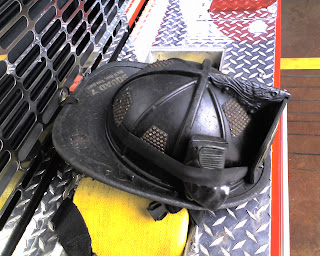I take a lot of pride in trying to know as much about my truck as I can, and I have a lot of information still to learn. I want to know everything from how many GPM's my truck will pump, to how many discharges of each size it has, to how many lugnuts are on the wheels. It's part of being a good driver in my opinion.

Welcome to my office
**note- image is from photobucket, not my truck**
I have not had the fortune of working for any captains that were what's now considered "Old School." I've taken part in some training that I believe is tradition, but nothing I've seen many folks put through regularly.
My first shift out of the academy, I brought donuts, set them on the table, and sat back out of the way. Once the shift started and I was shown where to put my gear and how to work the SCBA release in the seats, I was told I was not allowed to enter any part of the station other than the bay until I knew where everything was at on my engine.
I opened every compartment and spent some time going around and around that truck. When I finally felt comfortable enough, I entered the day room and was immediately quizzed by the guys. Since I answered everything correctly, I was allowed to stay, and sit down. I understood the reasoning then, and I'm thankful for the lesson it taught me. To this day, I can walk around an engine and really look at the compartments 1 time, and I'll remember where things are. It doesn't even take 5 minutes of my time.
Once I started learning about friction loss and other driver-specific duties, I had a very difficult time getting help. I was in a different crew, and the man I once looked to as my mentor had already retired. My shifts were spent on the ambulance, every shift that passed, I was on the ambulance. The truck was extremely busy, and I rarely was able to eat a warm dinner, much less study friction loss or practice pumping the engine at my station. For this, I blame that captain.
I took my personal time and attended a fireground hydraulics class offered by the state academy. I purchased and read, cover to cover, the IFSTA manual on Engine Operator. I took more time on my days off to go drive reserve engines around the academy, under the supervision of the instructors, to help build enough hours to meet the requirements to even take the test for pump school.
I felt the need to do all of these things because I wasn't getting the experience or help I felt I needed at the station-level.
When I took the entrance test for pump school, I passed, and few have ever matched or beat my score (so I've been told). The practicals testing was nerve-wracking, you know they are looking at everything. I had to repeat 1 part. You have to flow a 1 3/4" crosslay wide open, and you better get your own water supply before you cavitate. Oh, and make sure the TPM is set, a spike of more than 30psi on the line is grounds for failure. My first attempt, I was just a bit too slow and cavitated (no harm was done to the truck, the instructor stands by the pump panel to shut it down if needed, and the firefighter on the nozzle also closes the bale when he hears the engine over-rev).
I do not have the luxury of having the experience of pumping many many fires, but I do my best at every opportunity and the guys manning my hoselines have never brought any complaints to me. I look forward to pumping more fires, it's hard work, but it's a blast. The only bad thing about pumping, is having to stay outside with the truck.
I don't want to be a 2/20 firefighter, but I'm not afraid to share what information I do know. I managed to teach a veteran guy how to pressurize a watercan by backflowing the air up the nozzle. I can't begin to list the things I've been taught.
Like I said, I take a lot of pride in the things I've learned. Any of you folks out there that are fire guys, please feel free to share random bits of info that might be helpful, or rack my brain to see what I know. Non-fire folks, send me any questions you have about the things we do, why, or how we do them. If I don't have a good answer for you, I'll do my best to find one.

3 comments:
How many GPM's does ur truck pump?? You got me wondering!!!
My dad is probably what you consider 'Old School' He retired a few years ago... I loved his stories! Keep em coming!
-Dispatcher
It's rated as a 1,000 GPM pump.
But...Since pumps are rated while in draft (having to work to pull water into the truck from a static source like a lake), itwill probably pump much more than that when hooked to a hydrant (positive supply).
Send your dad on over here, I'd love to chat with him.
The differences in traditions between various departments is always fascinating to me.
As a boot fireman, I would never have been allowed to sit down in the day room, even if I was God. Talk about old school!
Any way, good post..
Post a Comment